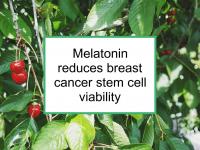Melatonin is a hormone that communicates information concerning available light to various organs. As such, melatonin is known primarily for its involvement in the regulation of circadian rhythms, however it has also been shown to have anticancer properties. In fact, lack of melatonin appears to increase the risk of breast cancer.
While most studies have focused on melatonin's chemopreventive activities in hormone receptor positive (ER+/PR+) breast cancer cells, melatonin can also have beneficial effects in hormone receptor negative (ER-/PR-) disease.
Now a new study has reported that melatonin can reduce the viability of both ER+/PR+ and triple negative (ER-/PR-/HER2-) breast cancer stem cells.
Latest research: Melatonin reduces the viability of BC stem cells
The study referenced at the beginning of this news article was designed to investigate the effects of melatonin in breast cancer stem cells. Most women who die from breast cancer develop resistance to treatment, which opens the door to cancer relapse. Previous studies have reported that cancer stem cells in tumors are responsible for recurrence and resistance to therapy. OCT4 is a transcription factor expressed by cancer stem cells in various types of cancer. OCT4 appears to be responsible for self-renewal and maintenance of pluripotency (the ability to develop into multiple cell types) of stem cells. This raises the possibility that blocking OCT4 expression could inhibit tumor growth, thereby serving as an effective breast cancer treatment.
To conduct the study, the authors assessed the impact of melatonin on the viability and expression of OCT4 in breast cancer stem cells, as well as in ER+/PR+ (MCF-7) and triple negative (MDA-MB-231) breast cancer cells. Each type of cell was grown in a three-dimensional model of mammospheres (representing the breast cancer stem cell population since mammosphere formation is typical of such cells). Treatment with melatonin was compared to no treatment. Mammosphere cell viability and OCT4 expression were determined.
Treatment with melatonin was found to reduce the viability of both ER+/PR+ and triple negative mammospheres. The expression of OCT4 was reduced in melatonin-treated cells compared to the untreated controls. This suggests that melatonin has beneficial actions against breast cancer stem cells by inhibiting cell viability via OCT 4. The authors conclude that melatonin has the potential to serve as a treatment for breast cancer.
